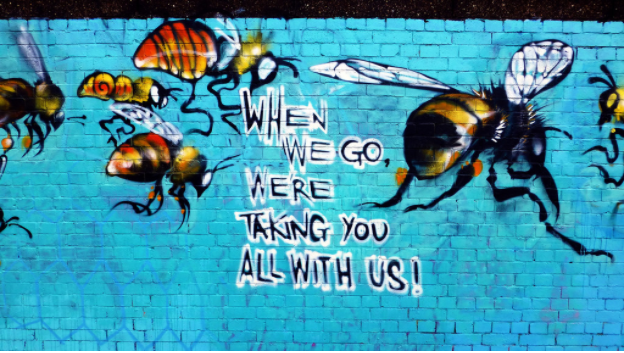Bees: beautiful bugs or strange stingers?
Caption: Passionately graffitied onto a brick wall, this warning to save these bees is one of many across the United States. Though many worry about the cost of saving this small species, it is necessary to all life on Earth.
May 18, 2017
Chances are, if you have been on Twitter in the past year, you have seen #savethebees circulating, but what does that really mean? While most of us may only know bees for their stinging capabilities, they actually play a much bigger role in our lives than that. Bees are the most common pollinator, pollinators being insects that transfer pollen from male to female plants facilitating plant reproduction. Though many fall under the illusion that this only applies to flowers, this pollination is necessary for crops we eat. Bees are the primary pollinators for fruits, vegetables, and coffee, and without them, the produce section of your local supermarket would be almost empty. Junior Rachel Gerney said, “Without bees we simply cannot eat, which affects not only me but everyone around the world.”
The bee population began plummeting after World War Two and has not stopped since. In the 1940s, it is estimated that there were six million bees, and there are only 2.74 million today, over a 54% decrease. Though the exact cause of the mass extinction is not known, introduction of non-native species and pesticides are two leading factors. As a culture, the trend of planting only one type of species, such as planting one type of grass in your lawn and nothing else, has made it more difficult for bees to pollinate and thrive. This is because they need a constant source of plants that are in bloom in order to sustain themselves.
Obviously, saving a species, even a small one, comes at a large price. First and foremost, research needs to be done. If the specific causes of bee decline are not pinpointed, no permanent solution can be made. Another large task at hand would be to monetarily motivate farmers to go organic, to keep them from using pesticides that kill the bees. Lastly, it require a cultural shift in gardening and landscaping, which boils down to sometimes letting the weeds grow.
Despite the difficulty saving the bees would take, it would be well worth it. The estimated cost for the benefits of pollination is 265 billion euros, over 282 billion US dollars. Not to mention, without the fruits and vegetables produced by bees the issue of obesity in the United States will only grow. Many corporations have already stepped up to the challenge, most notably General Mills Cereal. In order to draw attention to the declining bee population, they removed the iconic Buzz from Honey Nut Cheerios boxes. They did not quit there; they began a campaign to plant 3,300 acres of pollinator habitat throughout their supply chain. However, they cannot save the bees alone; it truly will take a village. To help you can plant gardens with flowers that bloom throughout the year to support your local bees! So it is time to forgive all the bees that have stung you in order to save this tiny, but mighty, species and ourselves.












